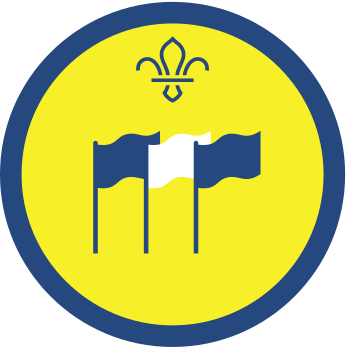
Play dreidel
You’ll need
- Scissors
- Glue sticks
- Sticky tape
- Coloured pens or pencils
- 10 - 15 pieces per player
- Printed copies of the template (one per person)
- A4 card or clean, recycled, thin cardboard, such as cereal boxes (if template printed on paper)
- Pencils or straws
Before you begin
- Use the safety checklist to help you plan and risk assess your activity. Take a look at our guidance to help you carry out your risk assessment, including examples.
- Make sure all young people and adults involved in the activity know how to take part safely.
- Make sure you’ll have enough adult helpers. You may need some parents and carers to help if you’re short on helpers.
Scouts is open to everyone. We don’t identify exclusively with one faith, and we welcome people of all faiths and of none.
We know it’s important for people to learn about each other, including understanding different faiths and beliefs. Scouts always respects people’s beliefs, faiths and cultures, and everyone should be open to learn.
As an inclusive and values based movement, we support our members to engage and learn about different faiths and beliefs in an exciting and meaningful way, even if they don’t have a faith themselves.
Celebrating and understanding differences, including differences in faiths and beliefs, is an important part of our Scout values, which are:
- Integrity: We act with integrity; we are honest, trustworthy and loyal.
- Respect: We have self-respect and respect for others.
- Care: We support others and take care of the world in which we live.
- Belief: We explore our faiths, beliefs and attitudes.
- Co-operation: We make a positive difference; we co-operate with others and make friends.
Our value of Belief and its exploration helps Scouts to learn from other faiths and beliefs. This encourages them to develop or build their personal beliefs and understand their shared values, whether faith-based on not.
We know that learning about faiths, beliefs and different attitudes can help to break down barriers, helps us all to recognise what we have in common, and teaches us to value and respect other people. It also helps us to build up respect, acceptance and knowledge for each other, leading to a more co-operative and inclusive society.
In our diverse society, people can sometimes feel cautious talking about this sensitive subject. However, it's important that Scouts offers young people safe, exciting and open spaces to explore faiths and beliefs. They should be able to engage in personal reflection, as they question and develop their opinions and understanding of the world around them.
Making time for personal reflection and developing our beliefs means exploring the places, people, communities, celebrations or stories which hold meaning for us, and it may not necessarily mean exploring a faith.
For example, someone’s shared values may be their Scout Values and that person may choose to reflect on them at important times, such as when they make their Promise. Others may choose to reflect at certain times of the year, such as a faith-based festival, birthdays, meaningful events or at New Year. Some people may still celebrate events, such as Christmas, but use it as a time to celebrate family, friends and loved ones, as well as for charity and giving.
Discover more about Faiths and Beliefs in Scouts.
What is Hanukkah?
- Hanukkah is a Jewish festival and it lasts for eight nights.
- The word 'Hanukkah' means 'Dedication' in Hebrew.
- It’s sometimes known as the Jewish Festival of Lights.
- Chanukah is the Hebrew spelling of Hanukkah, but it's pronounced the same way.
When is Hanukkah?
- It’s linked to the lunar calendar, so the date changes each year, but Hanukkah’s in either November or December.
What is Hanukkah about?
During Hanukkah, people remember when Jewish people won their freedom to practice their religion. This happened over 2,000 years ago in Israel.
What's the story of Hanukkah?
A long time ago a Syrian king called Antiochus banned the Jews from worshipping God. He put a big statue of himself in their temple and ordered them to bow before it.
However, the Jews refused to obey him because the Ten Commandments forbid them to worship anyone other than God.
A small group of Jews called the Maccabees fought back against the king’s army.
After three years, they won the war and recaptured Jerusalem from the Syrians.
When the Jews went back to their temple, they saw that it had nearly been destroyed. They cleaned and repaired the temple.
When they were finished, they rededicated it to God. They did this by lighting the lamp, which was a symbol of God's presence.
They only had one small jar of oil which was only enough for one day. However, miraculously the lamp stayed alight for eight days! That is why Jews light a candle every day of Hanukkah.
What is a menorah?
- A menorah is a type of candelabra, which is a candleholder with arms or branches. A Menorah is used in Jewish worship. They usually have space for seven candles, but a special one is used for Hanukkah, which has space for nine candles and is called a hanukiah.
- Hanukkah is celebrated by lighting one candle on a nine-stemmed candelabrum called a hanukiah each day. The hanukiah symbolises how God looked after the Jewish people during a difficult time. Lots of Jews call this candelabrum a menorah.
What happens during Hanukkah?
- Hanukkah is a very special time for Jews, so people often give each other gifts and Hanukkah money called Gelt. Some families give a small present to children on each of the eight nights of Hanukkah.
- Hanukkah is a great time for eating delicious foods. Some dishes have special significance, such as latkes (a kind of potato fritter), pancakes and doughnuts. This is because they are fried in oil. When they make them, Jewish people remember the miracle of the oil lasting eight days in the temple.
What is a dreidel?
- A dreidel (pronounced drey-del) is a four-sided spinning top, with a Hebrew letter on each side. The dreidel game is often played during Hanukkah.
- There’s a legend, that long ago, when Jewish people were forbidden from studying the Torah, they would read it in secret. When someone came along, they’d close their books and take out spinning tops, pretending they were just playing games.
Fun fact
- In 1993, astronaut Jeff Hoffman celebrated Hanukkah by spinning a dreidel in space for the first time. It was broadcast around the world!
Planning and setting up this activity
- For the pieces, you could use chocolate coins, counters, matchsticks, pennies, wrapped sweets, marbles or anything you can find lots of!
- Print out copies of the template, either straight onto card or print it onto paper and stick the paper onto some thin card, such as cereal boxes.
- Find out when Hanukkah is next taking place, so you can plan this activity during or around the festival. The date changes each year, but it’s usually sometime in November or December.
Running this activity
- Gather everyone together and explain you’re going to play a game called Dreidel, which is often played during the Jewish festival of Hannukah. Ask if anyone knows anything about Hanukkah. You may wish to share some facts about Hannukah, using the information on this page.
- Ask if anyone knows what a dreidel is. A dreidel (pronounced drey-del) is a four-sided spinning top, with a Hebrew letter on each side. The dreidel game is often played during Hanukkah. Players take it in turns to spin the dreidel, and win or lose pieces, depending on which letter it lands on.
- Tell everyone that you’re going to make the spinning top, using the template on this page. Give everyone a printed copy of the template. If the template is printed onto paper, you should stick it onto thin card first to make it sturdier.
- People should carefully cut around your dreidel template. You could use colouring pencils to decorate your dreidel, if you’d like to.
- Add glue on the tabs, or use sticky tape, to stick your dreidel together.
- On each section of your dreidel, draw one of these Hebrew letters. You could also write the names if you’d like to.
- נ (Nun)
- ג (Gimel)
- ה (Hey)
- ש (Shin)
- Finally, carefully make a hole in the top of your dreidel (on the flat side, opposite the pointed part), and insert a pencil or straw to act as handle for spinning.
Play the dreidel game
- Any number of players can play together, so you decide whether you want to play as a whole group or in smaller groups.
- Each group will need one dreidel. Alternatively, everyone could use their own dreidel to make the game faster.
- Each player starts with an equal number of pieces. It works well with about 10-15 pieces each.
- Each player puts one piece into the centre.
- The players take it in turns to spin the dreidel, using the pencil or straw as a handle.
- Let it spin and come to a complete stop then follow the instructions of the letter that lands facing-up.
- נ (Nun) = Do nothing – play passes onto the next player
- ג (Gimel) = Take everything – the player takes all the pieces in the pile.
- ה (Hey) = Take half - the player takes half of the pieces (if there are an odd number of pieces, round up to the nearest whole number)
- ש (Shin) = Put one in - the player puts one piece in the centre
- As you’re playing, if a player loses all their pieces, they’re ‘out’. If there are no pieces left in the centre, or there’s just one left, all players should add one piece to the centre.
- You can either play for a set amount of time, or until one player has won all of the pieces.
Reflection
This activity got everyone thinking about different faiths and beliefs within our communities. Are there any similarities between Hanukkah and any other festivals or celebrations people take part in?
Why is it important that people learn about festivals and celebrations that they don’t celebrate? People might suggest that they help us understand each other better, respect what is important to others, and teach us about history and cultures.
How would it feel if people didn’t understand and respect things that were important to you?
Safety
All activities must be safely managed. You must complete a thorough risk assessment and take appropriate steps to reduce risk. Use the safety checklist to help you plan and risk assess your activity. Always get approval for the activity, and have suitable supervision and an InTouch process.
- Scissors
Supervise young people appropriately when they’re using scissors. Store all sharp objects securely, out of the reach of young people.
- Glue and solvents
Always supervise young people appropriately when they’re using glue and solvent products. Make sure there’s plenty of ventilation. Be aware of any medical conditions that could be affected by glue or solvent use and make adjustments as needed.
If you want to make it harder, you could find an origami dreidel to make.
- Make sure you’ve got people on-hand to offer help, if needed, or encourage people to help each other.
- You could have some pre-made dreidels for people to decorate, rather than building and making them.
- You may want to have some cut out copies of the templates if anyone would find this task fiddly.
- Adjust the size of your groups, according to the needs of your group. A smaller group will mean people don’t have as long to wait for their turn.
- Rather than making the templates, you could always buy some wooden or plastic dreidels instead.
- You may wish to have a practice round, so everyone understands how to play the game.
- If anyone struggles with being out, if they become out, they could pair or team up with someone else to support them.
- Take a look at our guidance on active games to see ways you can adapt games to make them more accessible and inclusive.
All Scout activities should be inclusive and accessible.
If you enjoyed this activity, you could do more activities to celebrate Hanukkah. You may want to look at our badges to do with World Faiths.
If anyone in the group celebrate Hanukkah, you could offer them the opportunity to share their experiences, but only if they want to and are comfortable to do so. You may want to ask or chat to them before the session, so they don’t feel put on the spot or singled out.


